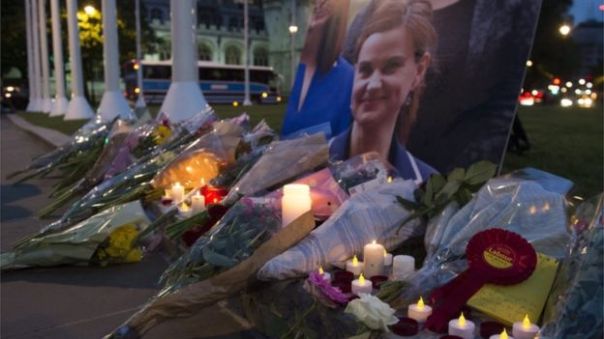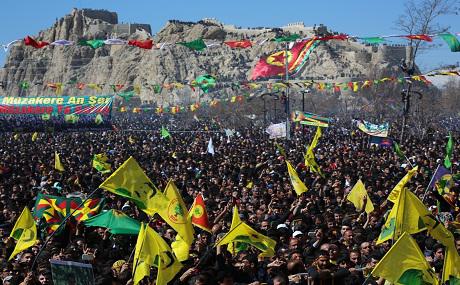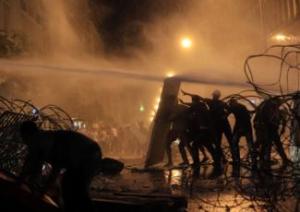UK: 10 Point Guide for Post-Brexit Resistance
 June 24, 2016
June 24, 2016
The statement of Workers Solidarity Movement (Ireland)
Response to Brexit Leave Vote
1. The Brexit vote for the UK to leave the European Union demonstrates that even weak parliamentary democracy is incompatible with escalating neoliberal inequality. In the UK as elsewhere a tiny segment of the population have taken a larger and larger share of total wealth in the last decades. Particularly under austerity almost everyone else has seen their share of the wealth they produce decline massively.
SYRIA: Syria’s forgotten revolutionaries: an interview with Leila Al-Shami
 June 22, 2016, Source: bookwitty
June 22, 2016, Source: bookwitty
Patrick Ward
In 2011 the Arab Spring swept the Middle East and North Africa. Millions of people rose up against dictatorships across the region, toppling governments in Egypt, Tunisia and Yemen, with the Libyan regime also falling following Western intervention. Among the countries in which revolution seemed to be on the cards was of course Syria. But, five years later, the country is in turmoil, with President Bashar Al-Assad clinging to the power he has left with the backing of the military might of Russia, Iran, Hezbollah and others. Facing them are reactionary Islamist forces such as Islamic State/Daesh and Jabhat Al-Nusra. The situation looks increasingly hopeless, and it is generally portrayed in the media as a battle between equally horrific forces, with ordinary people reduced to spectators desperately attempting to avoid barrel bombs or making terrifying journeys out of the country as refugees.
But there is a side to the story that is often overlooked – that of the continued resilience and self-organisation of Syrians resisting both the regime and groups like ISIS. This is the subject of Burning Country: Syrians in Revolution and War by Leila Al-Shami and Robin Yassin-Kassab, a comprehensive account of Syria’s recent history told often through the stories of people on the ground.
I spoke to Al-Shami about why contesting the prevalent narratives on Syria is so important. Read the rest of this entry
GREECE:Europe’s solidarity crisis: a perspective from Greece

June 8, 2016 Source: roarmag
Dimitris Christopoulos, George Souvlis
Refugees are not a cause but a symptom of a broader European political crisis, which a leading Greek scholar argues might well end up with Europe in ruins.
UK:Leeds AFN statement on the murder of Jo Cox

Photo kbctv
June 17, 2016, Source: leedsantifascists
Yesterday, after a constituency surgery at the library in Birstall, neer Leeds, Labour MP Jo Cox was subjected to a targeted, brutal and prolonged attack by an assailant who, according to multiple eyewitness accounts, shouted the words “Britain First” as he attacked, shooting and stabbing her multiple times. By the evening, news broke that Jo had died as a result of her injuries. Read the rest of this entry
FRANCE: Why Euro 2016 is a festival of cash and football business
June 10, 2016 Source: paris-luttes.info

Photo from Paris-Lutte.Info
Little analysis of the Euro, its sponsors, its construction of hiperexpensive stadiums and its violations of labor law….
A few days before the start of the most awaited competition in the football world, voices are raised to denounce a competition eroded by money and partnerships between companies of big capital. Besides the threat of terrorist attacks and fights between hooligans, an appeal was spread by militants against the Labour Law to disrupt the Euro in the continuity of the social movement in progress. The sponsors of the competition include entities such as Adidas, Coca-Cola, Credit Agricole, Mc Donald’s, Continental, Orange, the French Games, UEFA, the FFF etc. to justify the text. Similarly, 42,000 police officers, 30,000 gendarmes and 13,000 mobilized vigilantes throw light on an event based on both the financialisation of football and ultra-security of public space (fan-areas and grandstands). Read the rest of this entry
KURDISTAN: Kurdistan democratic confederalists
Source: Anarchy in Action

Photo: taku.net
With a population of 30 million, the Kurds are the world’s largest stateless people. They form the majority of Kurdistan, a region in Turkey, Iran, Syria and Iraq. Since 1999, their struggle for self-determination has taken an anarchstic turn, and communities in Kurdistan have established direct democratic governance modelled on the anti-authoritarian neo-Zapatista movement and the theories of US anarchist Murray Bookchin. While Kurds comprise the majority, the movement has been diverse and multi-ethnic. For example, in the canton of Jazira in Rojava (Syrian Kurdistan), Kurds, Arabs, Syriacs, Chechens, Armenians, Muslims, Christians and Yazidis co-exist and share political power.[1]
#YouStink Grows Up To Pose Real Challenge to Lebanese State
Over the past few weeks protesters in Lebanon have reemerged after a short slumber in great numbers, talking over downtown Beirut. “You Stink” protests, which started as result of a “garbage crisis” and government incompetence have been met with extreme repression leading to one death and hundreds of injuries. Bay Area Intifada reached out to a comrade on the ground who has been engaged in the demonstrations. Leyla is a anti-authoritarian queer from Beirut in their early 30’s. The following interview was conducted on Monday August 30th- Tuesday Sept 1st. No changes or edits have been to the text. Read the rest of this entry
Lebanon, August 2015: Notes on Paralysis, Protests, and Hope
by Maya Mikdashi
The past ten years in Lebanon have been a study in political paralysis and escalating anger and frustration among citizens and residents of the country. To recap only the most basic of facts, since 2005 the country divided and polarized into two “camps”—March 14 and March 8, led by the Future Movement and Hezbollah, respectively. In these ten years there has been a war with Israel, armed clashes between these two camps, and a series of political assassinations. These years have also brought the military destruction of a refugee camp (Nahr Al-Bared), armed clashes between the army and Islamists in Saida and Tripoli, a war in Syria that has again polarized the population, a series of bombings by radical Islamist groups across the country, and an ongoing war against ISIS in the north of the country. Lebanon has become a front in the international war on terror, according to the US, Israel, and the Lebanese government. Politicians have failed to form governments, leading to power vacuums and a series of caretaker governments and the degradation of government services and institutions. There has been a presidential vacuum for over fourteen months, and Parliament has illegally extended its own term twice so far. In short, there is no legitimately elected political representation in the country. Read the rest of this entry
Iraq, winds of hope
Since the end of July, and despite continued terrorist attacks by the so called Islamic State (IS) against Iraqi civilians, massive popular demonstrations have taken place in the capital Baghdad and several cities in the south of the country mainly to denounce corruption in the country and the political bankruptcy of the ruling sectarian political parties. Demands of the protesters notably included the dissolution of parliament, the end of the domination of the clergy on the structure of the Iraqi state and the modification of the Constitution to end the sectarian quotas. The demonstrations also condemned the continuing failures and power outages, deteriorating public services and increasing social inequalities. Read the rest of this entry
Nasrallah’s blood-soaked road to Jerusalem
By Budour Hassan
In early March of this year, about 6,000 smuggled photographs of torture victims in Syrian regime jails were leaked on the internet and published on various web sites.
The eyes of parents, siblings, partners and relatives of Syrian detainees became transfixed on their screens. Sorting through pictures of hardly-recognizable corpses, they wondered if they might find a trace of their loved ones.
Known as the “Caesar” photographs, in reference to the pseudonym of the defected Syrian sergeant and forensic photographer who smuggled the images out of Syria, the photographs inevitably lead us to question the morality and ethics of disseminating graphic portrayals of dead bodies on the internet. Read the rest of this entry


